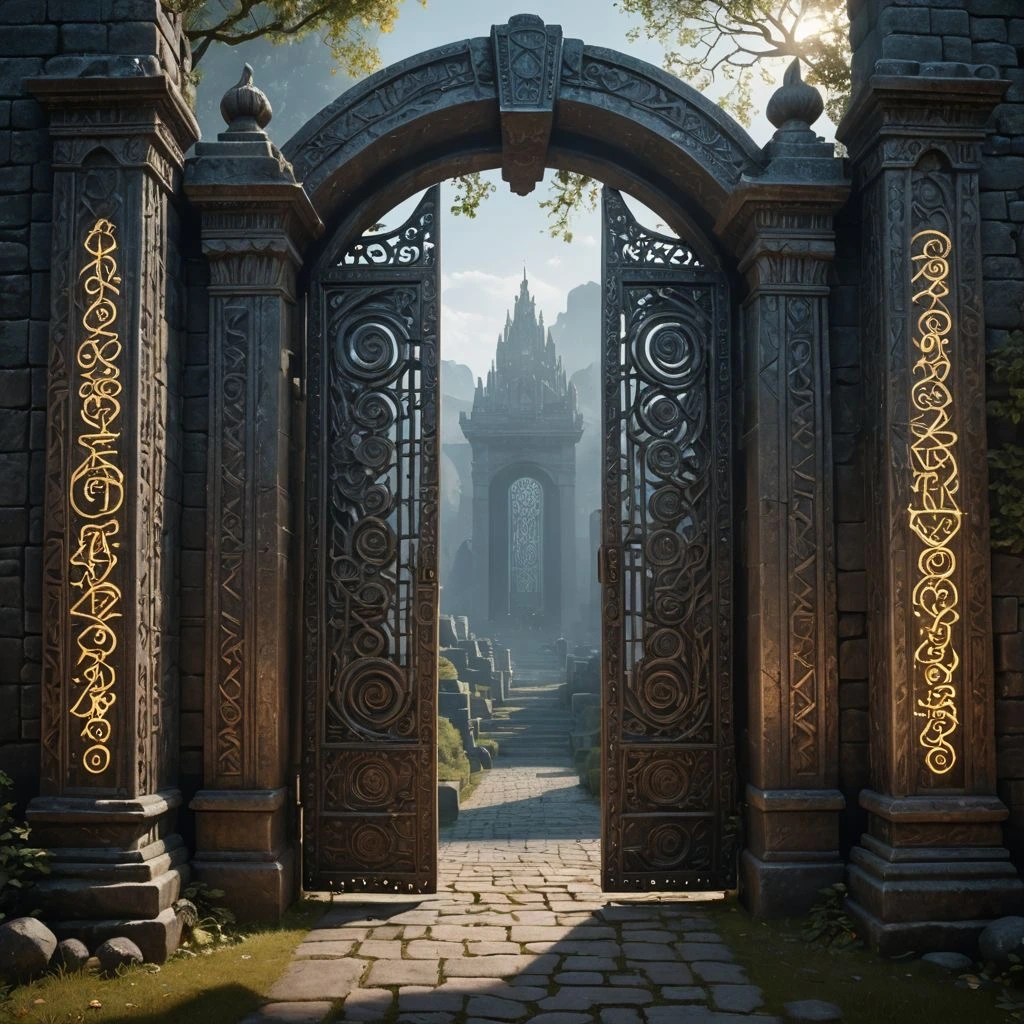Emiren stood before the towering gates of the City of Choice, their surface etched with ancient runes that pulsed faintly with an otherworldly light. The gates were neither fully open nor closed, as if waiting for something—or someone—to decide their state. A strange energy radiated from them, not unlike the tension before a storm. He could feel the weight of countless decisions echoing within the city, as though the very air was saturated with the choices of those who had walked these paths before him.

The voice of the hooded man still echoed in his mind: “You cannot go back.”
Taking a deep breath, Emiren stepped forward and placed his hand on the cool, smooth surface of the gates. They reacted immediately. The runes flared brighter, shifting and rearranging themselves into new patterns. A deep, resonant hum filled the air, vibrating through Emiren’s chest. Then, without warning, the gates swung inward with a slow, deliberate creak, revealing what lay beyond.
A City Between Realities
The City of Choice unfolded before him like a dreamscape—surreal, ever-shifting, and alive in ways no ordinary city could be. Streets paved with shimmering stones wound in impossible directions, some spiraling upward into the sky, others plunging downward into unseen depths. Buildings seemed to breathe, their walls flexing and rippling as though in response to the thoughts of those who passed by.
People moved through the city, each surrounded by faint, glowing threads of light that connected them to the structures, the streets, and even the air itself. Emiren realized these threads weren’t merely light—they were fragments of time, choices made manifest. He could see some threads branching endlessly, representing infinite possibilities, while others ended abruptly, severed by decisions that could not be undone.
As he stepped further into the city, a figure approached—a woman clad in flowing robes of silver and deep blue. Her eyes glowed softly, mirroring the threads of light around her. She carried an ornate staff topped with a crystal that pulsed like a heartbeat.
“Welcome, traveler,” she said, her voice melodic yet firm. “You have entered the Gate of Consequences. Few reach this place, and even fewer understand its purpose. Do you know why you’re here?”
Emiren hesitated, unsure how to answer. “I… I was told I have the power to shape time. That my choices can create or destroy its branches. But I don’t understand what that means—or what I’m meant to do here.”
The woman studied him intently, her gaze piercing yet kind. “You are a Shaper,” she said finally. “One of the rare few who can see time not as a linear progression, but as a garden of infinite possibilities. Here, in this city, you must face the truths of your past, your present, and your potential futures. Only then can you decide which branches to nurture and which to let wither.”
The Hall of Reflections
The woman gestured for Emiren to follow, leading him down a winding street that seemed to change with every step. What had been a narrow alley transformed into a wide plaza, then into a bridge suspended over a glowing river. At last, they arrived at a towering structure made of mirrored glass that reflected not just Emiren’s image, but fragments of memories—his childhood, his village, moments he thought he’d forgotten.
“This is the Hall of Reflections,” the woman explained. “Here, you will confront the choices that shaped you and the paths you did not take. It is a place of truth, where the illusions of certainty are stripped away. Are you ready?”
Emiren swallowed hard. “Do I have a choice?”
She smiled faintly. “There is always a choice. That is the nature of this city. But remember: every choice you make ripples through time, shaping not only your fate but the fates of others.”
With that, she stepped aside, and the doors to the hall opened soundlessly. Inside, the air was cool and still, heavy with a sense of waiting. Emiren entered, and the doors closed behind him.
The Faces of the Past
As soon as he stepped inside, the mirrored walls came alive. Scenes from his life unfolded around him, shimmering like water. He saw himself as a child, running through the fields near his village. He saw his mother, her face lined with worry as she struggled to make ends meet. He saw the forge where he had worked as a blacksmith, his hands calloused from shaping iron.
But the mirrors didn’t just show him what had been. They showed him what could have been.
In one reflection, he saw himself leaving the village as a young man, embarking on a journey to a distant city. In another, he saw himself refusing to help a wounded traveler who had once sought shelter in the forge—an act that led to the traveler’s death. Each image carried an emotional weight, as though the echoes of those choices still lingered in the air.
A voice broke the silence, deep and resonant. “Do you see now, Emiren, the threads that bind your life? Each choice you’ve made, and those you did not, has shaped the garden of your existence. Do you regret any of them?”
Emiren turned to find the source of the voice but saw only his reflection staring back at him, its expression questioning, almost accusing.
“I don’t know,” he admitted. “I’ve made mistakes, but I thought… I thought I was doing what was right at the time.”
The voice replied, “Intent does not erase consequence. The question is not whether you were right but whether you are willing to face the ripples of your actions.”